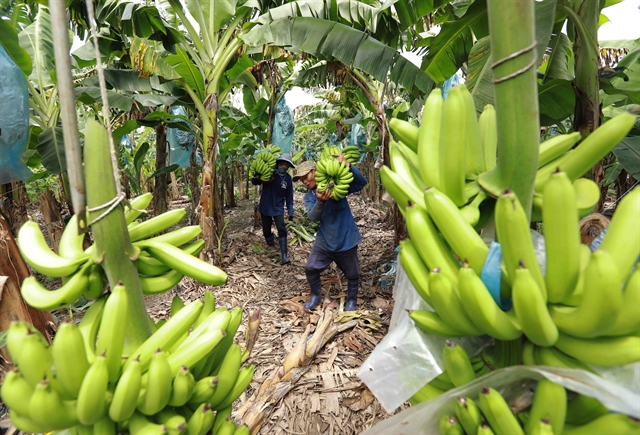 Society
Society

 |
| The 50ha Sáu Đức banana farm in Tri Tôn District’s Lương An Trà Commune exports to various markets. – VNA/VNS Photo Vũ Sinh |
AN GIANG – An Giang Province plans to restructure agriculture, developing linkages between various stakeholders to improve production efficiency and value.
The Cửu Long (Mekong) Delta province would transition from conventional agriculture into an agricultural economy, ensuring stable market access for farmers, its Department of Agriculture and Rural Development said.
This transition would involve a reduction in rice cultivation areas and expansion of vegetable and fruit farming and animal husbandry.
Nguyễn Sĩ Lâm, the department's director, highlighted An Giang's agricultural potential, showcasing key products like rice, tra fish and vegetables, and promising products such as fruits, beef, breeding pigs, and edible mushrooms.
Specialised farming areas have been established, fostering vital linkages among companies, co-operatives, co-operative groups, and farmers, according to the department.
An Giang leads in developing these critical partnerships with companies to produce agricultural products and establish large-scale rice fields within the delta.
It aims for annual agricultural growth of 2.8 per cent between 2021 and 2025, and a 150 per cent increase in farmers' average income to VNĐ64.5 million (US$2,600) by 2025.
It solicits investments in agricultural production and collaborations with farmers, co-operatives and co-operative groups.
Various methods are employed to encourage such investment, including capital contribution, skilled human resources, and technical consultancy. Agreements have been signed with companies for supporting agricultural co-operatives.
An Giang is focused on expanding co-operatives and co-operative groups to represent farmers in signing farm contracts with companies, ensuring stable outlets and prices.
Currently, it has 211 agricultural co-operatives with 18,999 members and 1,087 co-operative groups with 15,925 members.
Last year 63 co-operatives, two co-operative alliances and 180 co-operative groups with collaborations with companies farmed a total of 123,089ha.
The Phú Thạnh Agricultural Co-operative in Phú Tân District exemplifies effective linkage implementation, producing organic fertiliser from paddy straw and stubble for mushroom cultivation.
This circular economy approach optimises natural resource use and boosts members' incomes.
The province prioritises the adoption of advanced farming techniques to enhance product quality.
The number of farmers using technology has increased with the implementation of 235 advanced technique farming models covering crops, livestock farming and aquaculture in 2022-23.
In crop cultivation, 146 farming models use advanced techniques such as drip and smart irrigation, net houses and polygreen houses to grow vegetables, flowers, mushrooms, and seedlings.
This sector is a strength for the province, and farmers are encouraged to form partnerships to produce high-quality products while reducing production costs.
Vegetable cultivation using advanced methods yields 20-25 per cent higher than traditional farming approaches.
Moreover, the province has initiated 55 biosafety method-based models for breeding chicken, pigs, goats, and cattle.
Lâm emphasised the effective implementation of advanced farming techniques, labelling them as breakthroughs in the province's new rural area development. These techniques significantly contributed to increased rural incomes, he added.
The application of advanced technologies greatly benefited the province's agriculture, resulting in high-yield, high-quality products that are environmentally friendly and enhance competitiveness. – VNS